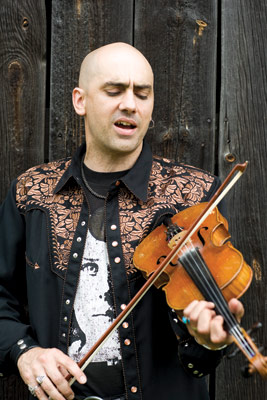In the domain of traditional ballad singing, Tim Eriksen wields astonishing power, with a voice full of deep, emotive qualities, a well-worn character and effortless fluidity. In fact, his new album, Soul of the January Hills, is a collection of unaccompanied ballads, shape-note hymns and folk songs, recorded completely live in one take with no editing, in a medieval abbey tower in Poland; quite an impressive feat in this modern age of digital doctoring and auto-tune correction.

Eriksen is somewhat of a paradox. He sounds like he's 250 years old — a compliment in traditional ballad singing — but his singing has an immediacy that grabs listeners and compels them to share in the moment of performance.
And though solo ballad singing might be a forgotten or ignored niche in the decidedly unpopular, commercially marginal world of traditional folk music, Eriksen isn't worried. "I see it as more of an opportunity than an obstacle," he tells Xpress. "It's great music, and the fact that it's currently obscure means the possibilities are wide open. It also means that for the moment, I'm the king (of this obscure sub-genre)."
Although he is an erudite ethnomusicologist, he's far from an academic archivist of old folk ballads; he re-infuses these well-traveled melodies and lyrics with new blood and an intensity that brings them fully into the present with re-invigorated life and meaning. And his collaborations are legendary.
Born and based in Massachusetts, Eriksen was raised in the northeastern American folk tradition. His expansive interests led him to various national and ethnic folk traditions around the world, including Indian, Albanian, Bosnian, Romanian and southern-Appalachian mountain music. In fact, he spent a major phase of his musical journey as a punk-rock influenced singer/songwriter/guitarist in the self-described "folk-noise" band Cordelia's Dad.
"I guess I'm just curious, but south-Indian music is the only stuff I've intentionally sought out, the rest has been serendipitous and tied to extraordinary experiences and people I've met along the way," Eriksen explains. "Bosnian music, Oromo gospel and more recently playing with (Cuban pianist/composer) Omar Sosa, and singing with a symphony orchestra — each is a long and improbable story. Believe it or not, I started singing ballads as a kid at about the same time I started playing hard-core punk, and I still love both. They're probably on opposite ends of some spectrum, but really close on whatever spectrum I'm on. If you listen carefully you can hear echoes of all the different music I've learned in my singing."
Over the course of his career, he has worked with an impressive variety of collaborators, and some very notable producers, including Steve Albini and T-Bone Burnett — with whom he worked on the movie Cold Mountain, coaching the actors on how to sing the sacred harp melodies, and contributing his voice and arrangements to the soundtrack.
Some of the most memorable experiences? Eriksen lists them, in stream-of-consciousness style: "Singing with a symphony orchestra at Carnegie Hall, a flaming car out back of Steve Albini's studio, playing the Academy Awards with Elvis Costello and Alison Krauss, working on set with Anthony Minghella, a near fistfight with Kurt Cobain, a triple vina concert at the Thyagaraja Samajam in Chennai India, singing gangas with the guys on Mt. Bjelasnica in Bosnia, mixing sacred harp with T-Bone Burnett while he was tracking with Sly Stone next door."
When asked if the new album was an intentional move to reacquaint listeners with the skill and real-time performance aesthetic found in old field recordings, he said, "I love the intensity and immediacy of unaccompanied singing; at its best it's great music and great storytelling. Soul of the January Hills is mostly an aesthetic statement, but it's also a challenge. Maybe it'll encourage someone to go out on a limb and trust their voice more, or maybe even get out of the habit of trying to make music sound better by editing and overdubbing it to death."
Sharing the bill with Eriksen is North Carolina Piedmont native Riley Baugus, who provides the perfect complement to Eriksen's sensibility as an American-folk-inspired singer and multi-instrumentalist. Baugus grew up in the mountain-music-rich area of Surrey County, learning fiddle/banjo/guitar directly from local masters Tommy Jarrell, Fred Cockerham, Ernest East and Benton Flippen, and he is one of the leading exponents of the vernacular musical tradition known as "Round Peak" style.
Like Eriksen, Baugus is also a talented singer of a capella ballads. Eriksen agrees: "I love gigging with Riley. We worked together on Cold Mountain and toured together with Ralph Stanley and Alison Krauss afterwards. People probably wouldn't put us together based on our head shots, but when you hear us sing you can tell we're brothers from another planet."
When not on tour with The Wiyos (www.thewiyos.com), Parrish Ellis lives in Asheville, writes songs and studies multiple idioms of American rural music, including western swing, country blues and Appalachian mountain fiddle and banjo styles.
who: Tim Eriksen, with Riley Baugus
where: The Grey Eagle
when: Thursday, May 20 (8:30 p.m. $10/$12. All ages. www.thegreyeagle.com. To note: Eriksen will also be a teacher for the traditional song week at the Swannanoa Gathering, July 5-9).



Before you comment
The comments section is here to provide a platform for civil dialogue on the issues we face together as a local community. Xpress is committed to offering this platform for all voices, but when the tone of the discussion gets nasty or strays off topic, we believe many people choose not to participate. Xpress editors are determined to moderate comments to ensure a constructive interchange is maintained. All comments judged not to be in keeping with the spirit of civil discourse will be removed and repeat violators will be banned. See here for our terms of service. Thank you for being part of this effort to promote respectful discussion.